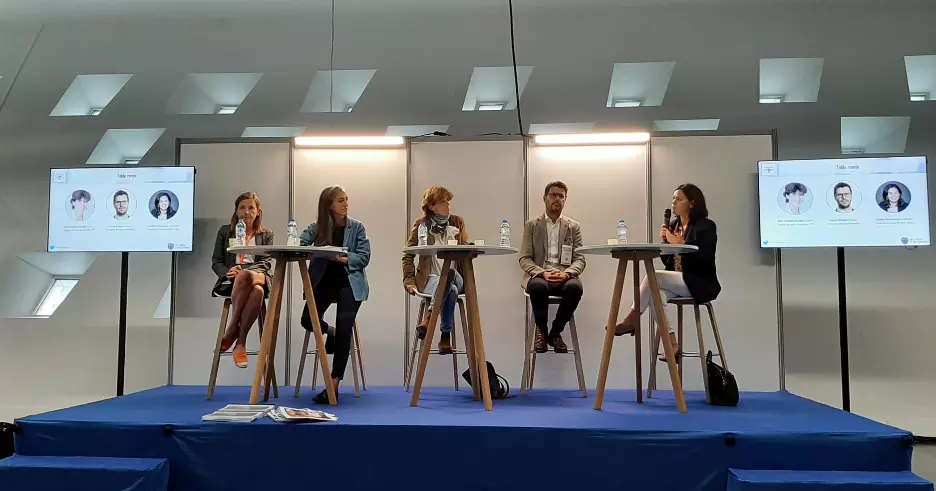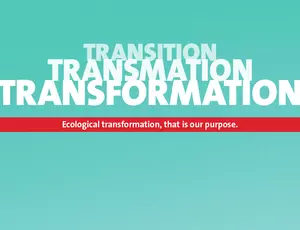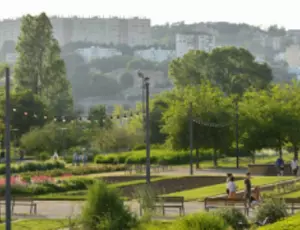“We have 10 years, no more, to regenerate the world.” This theme of the Produrable trade show - the biggest European event bringing together the players and solutions for a sustainable economy -, comprises different aspects: re-founding companies, reorientating finance, reinvesting in clean technologies, redistributing wealth, re-establishing trust, and boosting the economy thanks to ecology. Veolia contributed to several discussions on the 16th and 17th of September at the Palais des Congrès in Paris. Extracts from the Group’s presentations.

“Regenerating the economy, finance, companies: re-founding the system?”
Carine Kraus, director of sustainable development at Veolia, recalled in this plenary that the crisis has accelerated awareness of the ecological emergency and that we need to reinvent our economic model. At Veolia, the ecological transformation is part of the Group’s DNA: recycling waste water or other waste saves the resources and reduces the ecological footprint. To achieve this, the Group is extending its actions to other aspects:
We have gone from a patrimonial capitalism, and then a shareholder-based capitalism, to an extended performance capitalism. This year, for the first time, we are steering the Group according to five performance aspects: shareholders, employees, customers, territories, and the planet. In practical terms, as of 2021, the Group’s main managers will have a salary incentive based on 18 environmental and social indicators. It is a way of creating a new order via a mechanism based on pay.
To change the norm, the European green taxonomy will have an impact on investments. The proposals of “Fit for 55” will speed up the reduction of greenhouse gases before 2030. And at Veolia, we already put an internal “fictive” price on carbon when analysing our investments.
Veolia is going to create an “ecological transformation school” to prepare future professions and anticipate the needs for reconversion and training in the new skills required to respond to the environmental emergency.
“CSR and finance: Time for convergence?”
At Veolia, CSR is no longer considered as an option or an extra cost, it is now an essential part of our activity. The relationship between CSR, strategy and finance takes the form of close interactions and permanent dialogue, which is not just about calculating indicators, explained Philippe Hermann, director of sustainable finance at Veolia, when speaking at this round table.
During general meetings, investors are increasingly keen to have their say on the company’s environmental policy, starting with the climate. But they are also interested in other factors, and according to the Banque de France, 42% of investments are high or very high risk, on the theme of biodiversity and ecosystems. At Veolia, we don’t oppose CSR and finance, because we believe in a more sustainable economic model thanks to synergies with all our stakeholders, reflecting our purpose and our multifaceted performance. This choice precedes the recent regulatory changes, such as the European green taxonomy which acts as an accelerator to guide funding towards the ecological transformation.
Today the rising number of assessment models and rating agencies leads to greater complexity of the data which worries us. But we have no choice, we need to move towards more transparency. We are also participating in building the European tax system where we need to find the right balance between ambition and realism.
“Reinventing dialogue and corporate governance with stakeholders”
Armelle Perrin-Guinot, deputy director of sustainable development at Veolia, underlined during this round table that the prosperity of Veolia is based on its usefulness for each of its stakeholders - customers, shareholders, employees, suppliers, and the future generations-. With that in mind, the Group is taking action to establish an internal culture in the relationship with stakeholders that facilitates the dialogue.
This week Veolia has launched the mechanism “+1”, supported by the Committee 21, which brings together 50 Veolia stakeholders (employees, customers, suppliers, citizens, NGOs) with one objective: to think together about how to initiate a common impetus at the service of the ecological transformation. This mechanism will lead to a public deliverable to be copied in other territories, and even by other players than Veolia.
At the corporate level, the Group has been working since 2013 with a committee of Critical Friends bringing together independent experts on environmental and social issues. They participated in defining Veolia’s purpose and its ecological transformation plan.
We also need to involve our stakeholders in local governance: in Nimes, four representatives of civil society are part of the 10 administrators of the company operating the contract. That is also the case for Sabom, the water treatment contract with the metropolis of Bordeaux: over and above the executive board, local stakeholders are part of the different committees, such as the “Garonne” committee, focused on the research issues linked to the entire ecosystem of the Garonne. We want to copy these models on other territories where Veolia operates.

Biodiversity: what action can my company take?
Corporate action in favour of biodiversity begins by the analysis of the links that exist between their activities and nature, and by raising awareness amongst their employees. For that, it is vital to forge partnerships, especially with the local non-profit organisations.
Mathieu Tolian, deputy director of sustainable development at Veolia, shared during this round table the story of an approach in favour of biodiversity, initiated in 2004 and boosted by a partnership with the French Committee of the International Union for Conservation of Nature (IUCN) since 2008.
Veolia has a special relationship with nature due to its activities of water treatment and waste management. We have built up experience in the ecological management of the areas entrusted to us thanks to the development of tools to assess the impact of our activities and the definition of action plans. Today we want to go further than CSR and really bring nature into our strategy, by developing use of solutions based on nature, which can contribute to the efficiency of our services while ensuring the benefits for the natural spaces and biodiversity.
For more information



